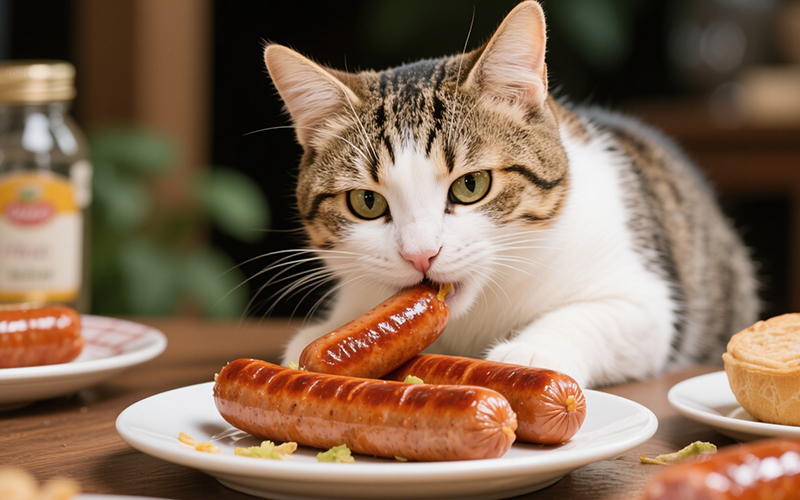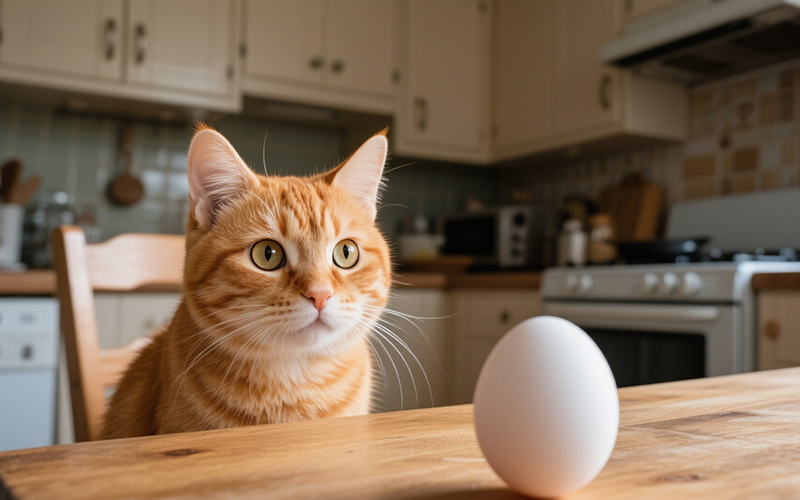Can Cats Eat Vienna Sausages? Here’s What You Need to Know
- 9 Apr 2025 14:52
Vienna sausages might seem like a convenient treat to share with your cat, but can cats eat Vienna sausages? While the idea of giving your cat a tasty snack might be tempting, there are several reasons why Vienna sausages are not a good choice for your feline friend. Let's explore why and what safer alternatives you can offer instead.

Why Vienna Sausages Aren’t Ideal for Cats
High Salt Content: Vienna sausages are packed with salt, which is one of the biggest concerns when it comes to feeding them to cats. Too much salt can lead to sodium poisoning, which can cause symptoms like excessive thirst, vomiting, diarrhea, and lethargy. Cats are particularly sensitive to high salt levels, and regular consumption of salty foods can lead to kidney problems over time.
Processed Meat: Vienna sausages are processed meats and typically contain preservatives and additives, such as nitrates and nitrites, which are used to enhance flavor and prolong shelf life. These chemicals have been linked to health risks, including cancer in both humans and animals. Cats should avoid processed foods, as they don’t offer the essential nutrients your cat needs to thrive.
High Fat and Calories: Vienna sausages are also high in fat and calories, which can contribute to obesity and pancreatitis in cats. If your cat is prone to weight gain or has a history of digestive issues, fatty processed foods like Vienna sausages are best avoided.
Lack of Nutrients: While Vienna sausages may provide some protein, they lack the essential nutrients that cats need, such as taurine (an amino acid essential for heart and eye health), vitamins, and minerals. Cats are obligate carnivores, which means they need whole, nutrient-dense foods to meet their dietary needs. Vienna sausages don’t offer the balanced nutrition that your cat requires.
Can Vienna Sausages Be Toxic to Cats?
Vienna sausages are not toxic to cats in small amounts, but they are not a safe or healthy treat. The high levels of sodium and preservatives, along with the fat content, can cause a variety of health issues if your cat consumes them regularly. If your cat eats a small piece of Vienna sausage, it’s unlikely to cause serious harm, but there are still risks to consider:
Sodium Poisoning: If your cat eats a significant amount of Vienna sausages, the high salt content can lead to sodium toxicity. Symptoms may include excessive thirst, vomiting, lethargy, and diarrhea. In severe cases, it can cause kidney damage.
Pancreatitis: The fatty content of Vienna sausages can trigger pancreatitis in cats, especially if they have a sensitive digestive system. Pancreatitis is a painful condition involving inflammation of the pancreas and can cause vomiting, loss of appetite, and abdominal pain.
Nutritional Imbalance: Feeding your cat Vienna sausages as a regular snack can result in a nutritional imbalance. Cats require specific nutrients, and processed meats like Vienna sausages do not provide the right balance. This can lead to long-term health issues if used as a primary source of food.
What to Do If Your Cat Eats Vienna Sausages
If your cat has eaten a small piece of Vienna sausage, it’s important to monitor their behavior and look out for any signs of distress. Here’s what you should do:
Monitor for Symptoms: Watch for any signs of vomiting, diarrhea, excessive thirst, or lethargy. If any of these symptoms occur, contact your veterinarian for advice.
Ensure Hydration: Make sure your cat has access to plenty of fresh water. This will help flush out any excess salt from their system and keep them hydrated.
Avoid Regular Feeding: Vienna sausages should not be a regular part of your cat’s diet. Keep processed meats, especially those with high salt and fat, to a minimum.
Healthier Alternatives to Vienna Sausages for Cats
If you want to give your cat a treat, there are much healthier alternatives to Vienna sausages:
Cooked Chicken or Turkey:Cooked chicken or turkey (without seasoning, skin, or bones) is a great source of lean protein for cats. These meats are much healthier and provide essential nutrients without the added salt or preservatives.
Canned Cat Food: If your cat loves meats like turkey or chicken, you can offer them canned cat food that contains these proteins. These foods are specifically formulated to meet your cat’s nutritional needs.
Fish:Salmon, tuna, or other fish are often a big hit with cats. Just make sure to remove any bones and avoid fish packed in oil. Fish can provide important nutrients like omega-3 fatty acids, which support healthy skin and fur.
Cat-Specific Treats: There are many commercial cat treats available that are designed specifically for feline dietary needs. These treats are made with safe ingredients and are a great way to spoil your cat without the health risks of processed meats.
Small Pieces of Veggies: If your cat likes veggies, you can offer small amounts of carrots, peas, or green beans. Just make sure to serve them in moderation as treats, not as a replacement for protein.
Conclusion
Can cats eat Vienna sausages? While Vienna sausages are not toxic in small amounts, they are not a healthy choice for your cat due to their high salt, fat, and preservative content. If your cat eats a small amount occasionally, it’s unlikely to cause serious harm, but feeding Vienna sausages regularly can lead to health issues like sodium poisoning, pancreatitis, and nutritional imbalances.
For safe and nutritious treats, stick to lean meats like chicken or turkey, canned cat food, or fish. And if you’re ever unsure about what foods are safe for your cat, consider consulting PettureX, which provides 24-hour online consultations and expert pet care assistance. 🐱🥩
Related

Can Cats Eat Egg Yolk Raw? A Vet's In-Depth Guide to Feline Nutrition & Safety
- 10 Jun 2025
Can Cats Eat Dog Kibble? Unpacking the Nutritional Mismatch!
- 29 May 2025
Can Cats Eat Deli Turkey? Slicing Through the Facts for Your Feline!
- 29 May 2025
Can Cats Eat Deer Meat? Exploring Venison for Your Feline!
- 28 May 2025
Can Cats Eat Corned Beef? Unpacking This Salty Human Delicacy!
- 28 May 2025
Can Cats Eat Cooked Rice? The Grain Truth for Your Feline Friend!
- 27 May 2025
Can Cats Eat Cornbread? A Crumb of Truth for Curious Cat Owners!
- 27 May 2025
Can Cats Eat Cooked Meat? Sizzling Facts for Your Feline's Feast!
- 26 May 2025
Can Cats Eat Chili? Spicing Up the Truth About This Human Dish!
- 26 May 2025
Can Cats Eat Chicken Eggs? Cracking the Code on This Feline Food Query!
- 24 May 2025
